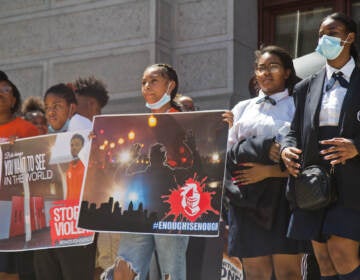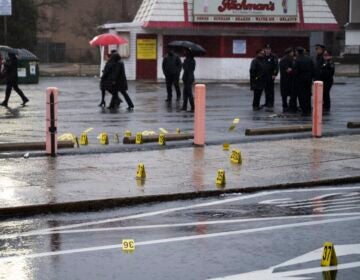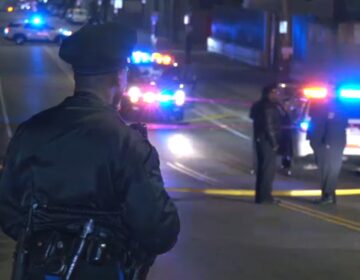‘I just want to warn people’: A mother’s fight to review Pa.’s Stand Your Ground law and reopen Donae Cooper’s case
Nearly a year after Donae Cooper’s shooting death, her mother wants the case reopened.
Listen 1:26
Donna Cooper is advocating for Pennsylvania's 'Stand Your Ground' laws, sometimes known as 'Castle' or 'Shoot First' laws, to be changed. Her daughter, Donnae Cooper, was shot in 2022. The shooter faced no charges due to Stand Your Ground rules. (Sam Searles/WHYY)
A mother’s grief has turned to pleas for further attention — both for her daughter’s shooting death to be reinvestigated — and for the law she says made it possible for the shooter to avoid charges: Pennsylvania’s Stand Your Ground law.
Jessica Whitfield sat on the couch inside Donna Cooper’s living room.
As a board member of the Central Philadelphia chapter of Parents of Murdered Children, she’s a source of support and an advocate for parents who’ve lost children.
She listened intently as Donna talked about her daughter, Donae.
Donae was 20 years old when she was killed, shot from behind by a man she’d been talking to for less than a month. The man was not charged due to Pennsylvania’s Stand Your Ground law.
Nearly a year later, Donna Cooper wants others to know about Stand Your Ground — what it is, what it means for cases like Donae’s, and what warnings should be given to everyone, but especially young women.
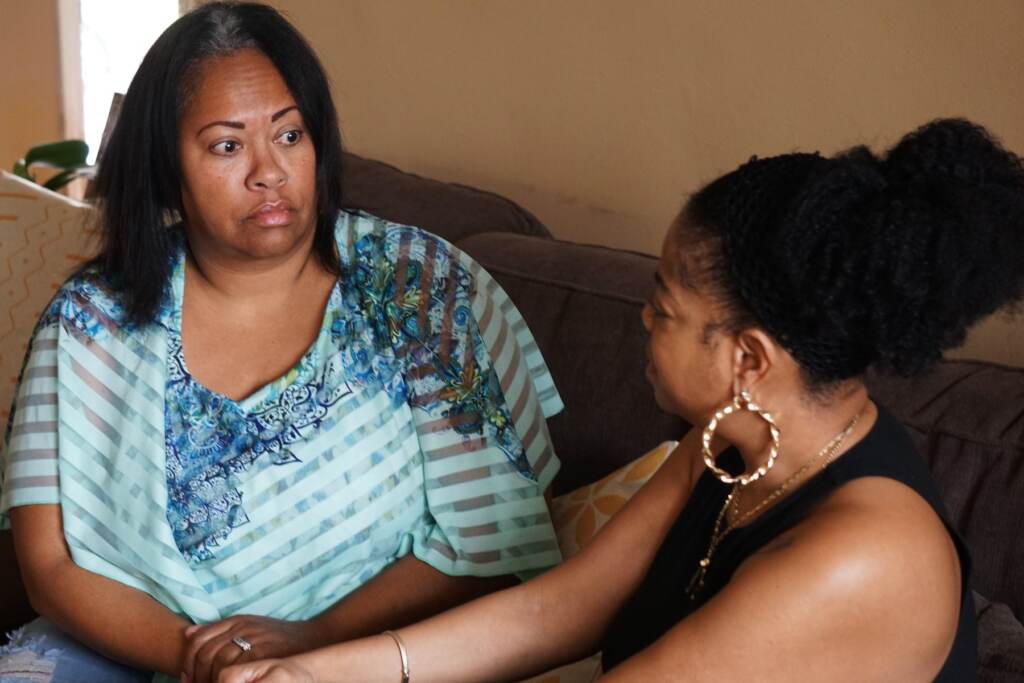
The story
“Donae was funny,” Cooper said, smiling. “She became a fashion icon. Couldn’t wear her clothes twice.”
Born in 2001, Donae Nya was Cooper’s only child. At the time of her death, Donae was enrolled at Lincoln University, trying to decide on a major. “She had an entrepreneurial spirit. She was going to be a go-getter,” said Cooper.
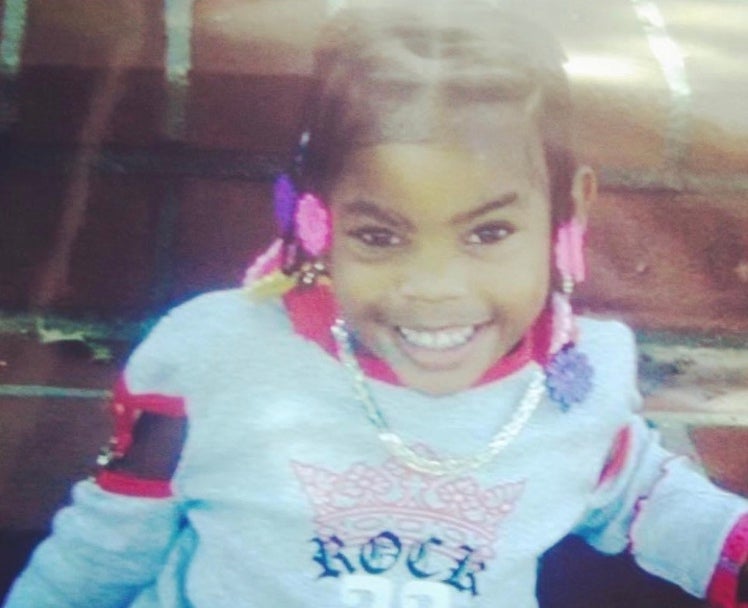
Donae had been talking with someone new on social media for a few weeks. She’d told her mother that the few dates they had went well. On July 15, 2022, Donae left her mother’s home and traveled to meet up with her new interest. “She went to go see him … I didn’t know that. I thought she was running out to get something to eat and she was dead, all within an hour of her leaving my house.”
According to police, Donae and the man had gotten into an argument, which escalated with Donae throwing some household items at him and using a small taser. At some point during the argument, the man called the police. Donae left the Tioga home, and returned shortly after. The man opened the door, and, a few moments later, shot Donae from behind.
In the following weeks, the shooter would admit to killing Donae, but said it was in self-defense. “Donae was throwing things, maybe destroying something,” Cooper said. “That’s the loophole.”
The law
Cooper said her daughter’s case wasn’t covered beyond the initial shooting report. She believes that, because the shooting was deemed justified by the law, the man who shot Donae might feel emboldened to do it again.
“[Pennsylvania] has a law that you have the right to protect your property and your person in your home,” said Cooper. “And I fully agree with that — if a masked man came into your house and you have a legal gun and you shoot him, you’re protecting yourself, you’re afraid. But I don’t agree with it if you know the person, you just was dating them, y’all have an argument, and you shoot her.”
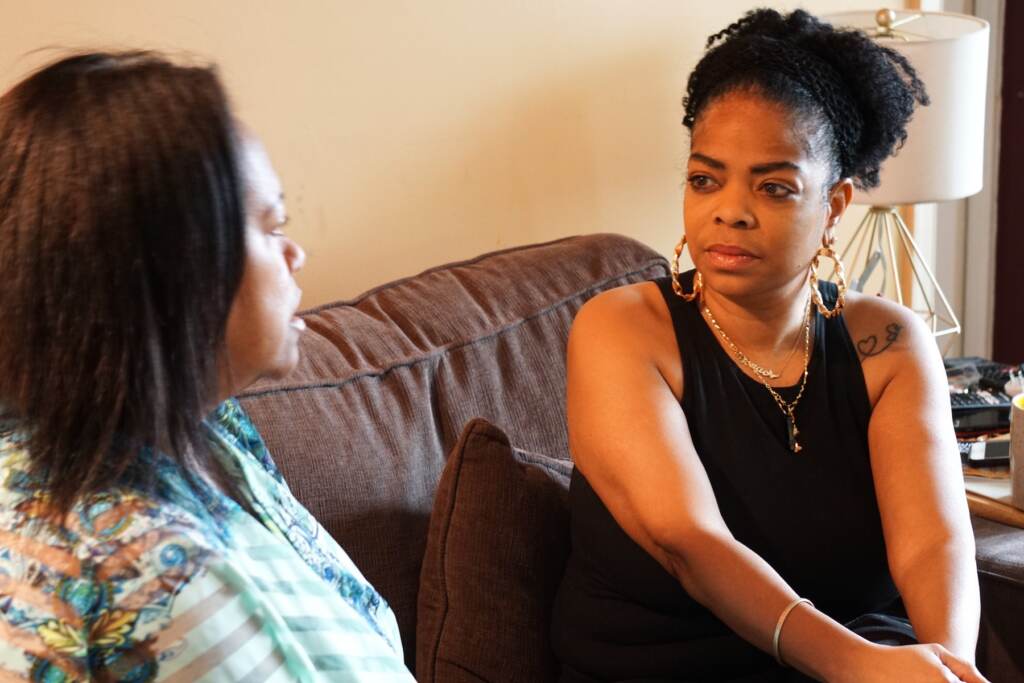
Stand Your Ground laws, also referred to as “Castle” laws and by gun control advocates as “Shoot First” laws, have existed in the U.S. since 2005, when Florida updated its “Castle” doctrine. Castle doctrine, in general, is the idea that — as the saying goes — “a man’s house is his castle.” Defending your home is always acceptable, and retreating from an attack on your own property isn’t necessary. Pennsylvania’s law was passed in 2011. Like most Stand Your Ground laws, it takes the Castle doctrine a step further: Stand Your Ground includes a no-duty-to-retreat provision. If an attack happens, homeowners are not required to leave the situation and may use anything up to deadly force to defend themselves or their property.
Stand Your Ground made national news in the killings of both Trayvon Martin and Ahmaud Arbery. Both victims were Black, and their shooters white men who claimed to fear for their lives.
Trayvon Martin was 17 years old when he was shot and killed by George Zimmerman in Florida. Zimmerman was eventually acquitted of the charge of second-degree murder, but the case placed Stand Your Ground laws into the national spotlight.
Ahmaud Arbery, 26, was jogging through a neighborhood in Georgia when Travis, Greg McMichael, and their neighbor William “Roddie” Bryan chased him in their trucks and shot him, claiming Arbery was a burglar. The McMichaels and Bryan were charged with hate crimes and sentenced to life in prison last year.
Stand Your Ground was also used as a defense for Kyle Rittenhouse, the teen who killed two men and injured a third during a protest in Wisconsin, despite having traveled there from his Illinois home.
Studies have shown that states with Stand Your Ground rules have suffered increases in gun homicides.
The advocates
Donna Cooper, with support from Jessica Whitfield of Parents of Murdered Children, wants Donae’s case reopened.
“I think a lot of females can relate to throwing something or damaging something in somebody’s house,” she said. “It doesn’t give you the right to kill because that happened.”
Cooper says Pennsylvanians might not be aware that a Stand Your Ground law is on the books here. “I knew about it with Trayvon Martin in Florida, but I never knew that [it was here]. Because if I knew it, that would have been an additional thing I would have warned my daughter about.”

Donna says she thinks Donae’s case would have received more attention if it weren’t “lost in the gray area” of Stand Your Ground, and if Donae had been a white woman.
“I just want to warn people,” Cooper said, holding a memorial blanket printed with Donae’s face, birth year, death year, and false eyelashes, commemorating her daughters’ love of makeup and aesthetician skills.
“I can understand the Stand Your Ground law if you’re in your home and you see somebody in all black come into your house and you shoot them, OK? You were scared. You didn’t know that person,” Cooper explained. “But as far as killing somebody you just took out the dinner because I had an altercation in a house? That’s the gray area.”
If you or someone you know has been affected by gun violence in Philadelphia, you can find grief support and resources online.
Sam Searles is a Report for America corps member covering gun violence and prevention for WHYY News.

Get daily updates from WHYY News!
WHYY is your source for fact-based, in-depth journalism and information. As a nonprofit organization, we rely on financial support from readers like you. Please give today.


